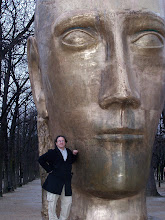I wrote this last week but it got lost in the place where messed up computers send things. I will recreate my thoughts as best I can.
I have been trying to discern themes at these shows or at least currents within them. This one had some kind of Asia Minor/West Asia theme. Richard Danielpour's Concerto for Orchestra (Zorastrian Riddles) was half played (First two of the four movements), Mozart's Fifth Violin Concerto with it's Turkish bit in the third movement finished the first half, and Richard Straus' Also Sprach Zarathustra was the second half. Zoraster and Zarathustra are names that refer to the same ancient Persian mystic/holy man. In addition, Danielpour notes in an interview in the cd booklet for the PSO recording of his piece that the riddles idea came from an account of Mozart, in costume, reading elaborate riddles to the audience between musical pieces.
That said, I do not discern anything musical that connects these pieces. For me, the real riddles were: Who is Andris Nelsons (the conductor); Who is Stefan Jackiw (the violinist); and most important, why do half a piece that was clearly concieved as a whole piece, particularly when the show was not overly generous in terms of ammount of music?
I have no answer to the first question but it seems a lousy way to treat their "Composer of the Year". I found the Danielpour interesting but the influences seemed obvious, Bernstein, Copland, Stravinsky ala Petrushka. Maybe I will get to hear the rest when they randomly program the second half of the piece someday.
Stefan Jackiw has been getting good notices where he has played but is not known otherwise to me as he has not had any reordings released yet. I am not sure I would grab a recording unless the repertoire was interesting but I was impressed with his playing. I have been told by violinist friends how deceptively difficult Mozart's violin concertos are. I believe this is because you have to be musical first and a virtuoso second (does that make sense?). Jackiw did a good job not jumping all over the piece but giving it space, particularly in the slow middle movement. His encore of the first movement of Bach's third partita was quite a treat, especially as I had just heard Jennifer Koh play the entire piece just weeks before (see my earlier entry for that). The differences between the two reminds me of the importance of context in performance, Jackiw was showing off with this piece after the relative restraint of Mozart (and showing off in a good sense, brilliant playing) while Jennifer Koh's performance was restrained and beautiful, setting up the intense performace of the Ysaye piece that followed.
Also Sprach Zarathustra was well played, the brass being outstanding as always. The guest concertmaster (from the St. Paul Chamber Orchestra) was excellent in the solo violin bits. Nelsons conducted with a good bit of animation though the reading was a fairly broad one, clocking in at about 34-35 minutes. I sometimes have trouble with this piece because I know Nietzsche too well. Straus' piece seems a bit sentimental and that does not seem a good fit for Nietzsche. And the best part of the piece really is that incredible beginning made famous by Kubrick. I was able to set those things aside and enjoy the show.
Overall an excellent show, with two new performers showing potential. But PSO programers, please go ahead and play a whole piece, especial as a way to support new music.
Sunday, November 22, 2009
Pittsburgh Symphony Orchestra - November 13, 2009
Labels:
Andris Nelsons,
Danielppour,
Mozart,
PSO,
Richard Straus,
Stefan Jackiw
Subscribe to:
Post Comments (Atom)

No comments:
Post a Comment